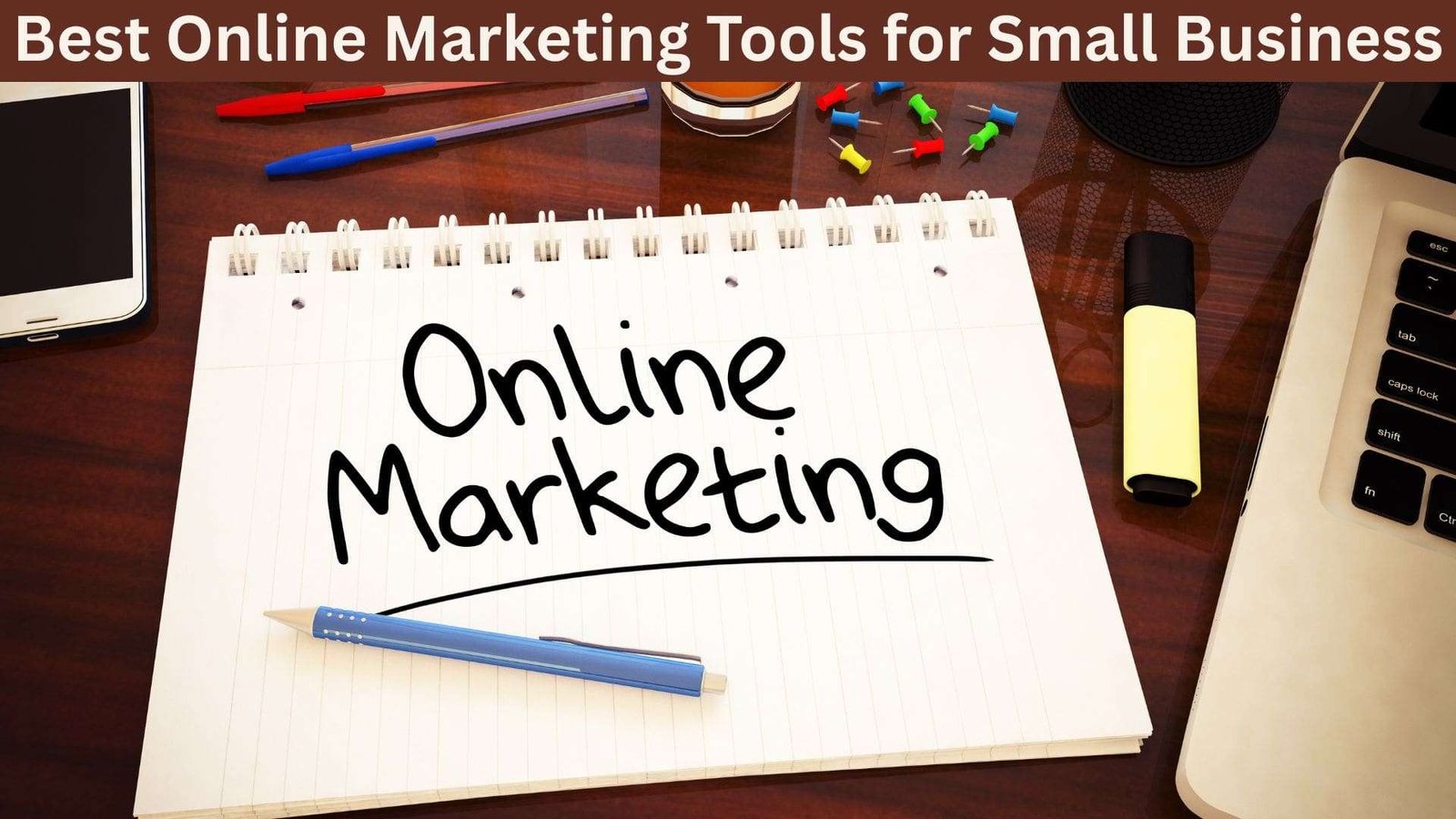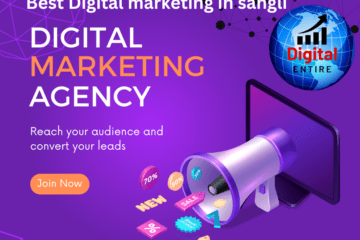Best online marketing tools for small business help streamline processes and boost growth without a large budget. Social media management tools like Buffer and Hootsuite simplify scheduling and engagement. Email marketing platforms such as Mailchimp and Constant Contact enable businesses to reach and nurture leads effectively.
For SEO, tools like Google Analytics and SEMrush enhance website visibility and performance. Marketing automation tools like HubSpot and ActiveCampaign save time by automating follow-ups and lead nurturing. These tools provide small businesses with the ability to track, analyze, and optimize their marketing efforts for better results.
Table of Contents
Why Online Marketing Tools Are Essential for Small Business Success
In today’s competitive landscape, leveraging the right digital resources can significantly impact small business growth. Here’s how:
🔹 Enhance Online Visibility
Online marketing tools help small businesses reach a broader audience by improving visibility across platforms like search engines, social media, and email. This leads to increased website traffic and brand awareness.
🔹 Cost-Effective Promotion
For businesses with limited budgets, digital tools offer affordable ways to promote products and services. Tools for small business marketing—like social media schedulers and email platforms—deliver high ROI without high costs.
🔹 Targeted Marketing Campaigns
With data-driven insights, businesses can create customized campaigns targeting specific customer segments, improving engagement and conversion rates. Analytics tools track performance and optimize campaigns in real time.
🔹 Boost Customer Engagement
Digital Marketing tools support personalized communication, allowing businesses to respond to customer inquiries instantly and keep them engaged through relevant content and offers.
🔹 Streamline Daily Marketing Tasks
Automation tools simplify repetitive tasks such as email blasts, social media posting, and lead follow-ups—saving time and boosting overall productivity.
🔹 Real-Time Data and Reporting
These tools provide valuable metrics, helping business owners make informed decisions, understand customer behavior, and adjust strategies quickly.
In conclusion, using a blend of effective online marketing tools is not a luxury but a necessity for small businesses aiming to grow, compete, and thrive in the digital economy.

Best Online Marketing Tools for Small Business and Top Social Media Management Tools That Work
Social media marketing can be overwhelming for small businesses, but the right tools make it simple and effective. Here are some top platforms that streamline your efforts:
🔹 Buffer – Easy Scheduling and Performance Insights
Buffer allows businesses to schedule posts across multiple platforms and analyze performance metrics in one place. It’s ideal for maintaining a consistent presence online.
🔹 Hootsuite – All-in-One Social Media Management
With Hootsuite, small businesses can manage multiple accounts, schedule content, and monitor engagement from a single dashboard. It’s a powerful option for growing businesses with diverse needs.
🔹 Sprout Social – Social Listening and Advanced Reporting
Sprout Social provides robust reporting tools and social listening features that help businesses understand what their audience wants and respond effectively.
🔹 Zoho Social – Affordable and Feature-Rich for Small Teams
Designed for small enterprises, Zoho Social offers smart scheduling, keyword tracking, and analytics at an affordable price—perfect for startups and tight budgets.
🔹 Benefits of These Tools
Using these Tools for Small Business operations can dramatically reduce time spent on daily tasks, improve engagement with followers, and deliver actionable insights. These Digital Marketing tools also help brands stay organized, proactive, and responsive to trends.
By integrating these Digital Marketing tools into your workflow, you empower your small business to execute smarter, more effective social media strategies that contribute to long-term success.
Top Email Marketing Tools Every Small Business Should Use for Growth
Email marketing remains one of the most cost-effective ways for small businesses to build customer relationships and boost revenue. Here are top tools to help streamline your efforts:
🔹 Mailchimp – User-Friendly and Budget-Friendly
Mailchimp is one of the most popular platforms for small businesses. With its drag-and-drop email builder, pre-designed templates, and free plan, it’s ideal for beginners. This digital marketing tool free option helps small businesses start without upfront costs.
🔹 Constant Contact – Powerful Lead Nurturing
Perfect for growing businesses, Constant Contact offers strong automation features, email tracking, and real-time reporting. It’s particularly effective for nurturing leads through scheduled campaigns and timely follow-ups.
🔹 ConvertKit – Designed for Creators and Small Teams
ConvertKit is best for bloggers, coaches, and content-driven small businesses. It offers intuitive features like automation workflows, tagging, and segmentation to deliver personalized content to your audience.
🔹 Benefits of These Tools
Using marketing tools for small business allows owners to automate repetitive tasks, such as welcome emails and product follow-ups. These platforms Tools for Small Business help in tracking open rates, conversions, and click-throughs, making it easier to refine strategies over time. Moreover, they aid in building lasting customer relationships by delivering relevant and timely messages.
Powerful SEO Tools for Small Businesses to Improve Online Visibility and Rankings
In today’s digital landscape, small businesses must leverage SEO to stand out in search results and drive organic traffic. Here are some top SEO tools that can make a big difference:
🔹 Moz – All-in-One SEO Suite
Moz offers keyword research, site audits, rank tracking, and on-page optimization tools. Its user-friendly interface is perfect for beginners and small business owners seeking a complete SEO solution.
🔹 SEMrush – Competitive Edge with Analytics
SEMrush helps small businesses perform deep competitive analysis, track keyword performance, and uncover content gaps. It’s great for developing data-driven content strategies and improving search rankings.
🔹 Ahrefs – Mastering Backlinks and Content Analysis
Ahrefs is known for its powerful backlink checker and in-depth SEO reports. It allows small businesses to analyze competitors’ backlink profiles, discover new linking opportunities, and optimize their own content.
🔹 Benefits of Using SEO Tools
Using these marketing tools for small business helps boost search engine rankings, attract more qualified visitors, and convert them into leads. They also simplify complex SEO processes, saving time and improving accuracy. Additionally, some digital marketing tools free options are available within these platforms, allowing businesses to get started without a large investment.
By incorporating these SEO tools into their strategy, small businesses can gain better visibility, improve online presence, and grow sustainably in a competitive market.
Affordable Alternatives to Google Ads for Small Business Marketing Success
Small businesses often seek cost-effective ways to advertise online, and there are several excellent alternatives to Google Ads that can help boost visibility and sales. Here are some platforms worth considering:
🔹 Facebook Ads – Target Specific Demographics
Facebook Ads allow small businesses to target very specific audiences based on location, interests, behaviors, and more. This ensures that marketing dollars are spent efficiently, reaching the right customers.
🔹 Instagram Ads – Visual Advertising for Better Engagement
Instagram, a highly visual platform, offers businesses the chance to create captivating ads that resonate with users. Small businesses can use Instagram Ads to promote products, services, or offers, benefiting from higher engagement rates.
🔹 Bing Ads – Cost-Effective PPC Option
Bing Ads is a great alternative for businesses that want to reach a different audience while spending less on pay-per-click (PPC) ads. With lower competition compared to Google, Bing offers a more affordable option for businesses looking to maximize their ad spend.
🔹 Benefits of These Advertising Platforms
These tools for small business advertising options help companies reach their target audience effectively, improve ad performance, and manage budgets. Each platform offers unique targeting capabilities, allowing businesses to tailor their messages and attract the right customers. Plus, several of these platforms provide digital marketing tools free for smaller ad budgets, making it easier for businesses to get started.
Essential Analytics Tools for Tracking Marketing Performance and Driving Results
Analytics tools are key to understanding how marketing campaigns are performing. By gathering insights and data, small businesses can optimize their strategies and improve ROI. Here are some essential tools to consider:
🔹 Google Analytics – Free and Powerful Tool for Tracking Website Data
Google Analytics is a must-have for any small business. It provides detailed insights into website traffic, user behavior, conversions, and more. This marketing tool for small business helps businesses understand how visitors interact with their sites, enabling data-driven decisions for optimization.
🔹 Hotjar – Heatmaps and Visitor Behavior Analysis
Hotjar allows businesses to track user interactions with heatmaps, screen recordings, and session replays. It’s an excellent tool for understanding visitor behavior and identifying potential pain points on websites, making it a valuable resource for improving user experience and engagement.
🔹 Kissmetrics – Actionable Insights for Conversion Optimization
Kissmetrics specializes in tracking customer journeys and providing actionable insights to increase conversions. By focusing on key metrics like lifetime value (LTV) and churn rate, businesses can refine their strategies to retain customers and boost sales.
🔹 Benefits of Using Analytics Tools
These tools for small business help businesses track, measure, and analyze marketing efforts effectively. They provide valuable insights for improving conversion rates, enhancing user experience, and refining strategies. With the right data, small businesses can make informed decisions, optimize campaigns, and ultimately improve ROI.
Best Online Tools to Create a Professional Website for Small Businesses
Creating a professional website is essential for small businesses to establish an online presence. Fortunately, several online tools make it easy to build a stunning website without needing coding skills. Here are some top options:
🔹 Wix – Drag-and-Drop Simplicity
Wix is a popular website builder known for its user-friendly drag-and-drop interface. Small businesses can quickly create professional-looking websites by choosing from a wide range of customizable templates. Its intuitive design process makes it ideal for businesses without a technical background.
🔹 Squarespace – Beautiful Templates for Businesses
Squarespace offers sleek and modern templates designed for businesses looking to showcase their products and services. It’s perfect for small businesses aiming to create visually appealing websites with minimal effort. Squarespace also provides excellent customer support and marketing features.
🔹 WordPress – Powerful and Flexible for Long-Term Growth
WordPress is one of the most popular website builders, offering incredible flexibility and customization options. While it may have a steeper learning curve compared to Wix or Squarespace, it’s ideal for businesses looking for long-term growth and scalability. WordPress supports a wide range of plugins, themes, and integrations to enhance functionality.
🔹 Benefits of Using These Tools
These tools for small business help businesses create a professional online presence without needing coding skills. They offer customization options, SEO tools, and e-commerce features that help businesses grow. By using these marketing tools for small business, entrepreneurs can launch functional, attractive websites that reflect their brand and attract customers.
Top Marketing Automation Tools to Save Time and Boost Efficiency
Marketing automation tools help businesses save time and improve their marketing efforts by automating repetitive tasks. These tools are especially useful for small businesses looking to streamline operations and enhance customer engagement. Here are some top options:
🔹 HubSpot – All-in-One Marketing Automation
HubSpot is a comprehensive platform offering tools for email marketing, lead generation, customer relationship management (CRM), and social media management. It’s a perfect marketing tool for small business owners who want to automate various aspects of their marketing campaigns in one place.
🔹 ActiveCampaign – Email and CRM Automation
ActiveCampaign is known for its powerful email automation capabilities combined with CRM integration. Small businesses can create personalized email campaigns, automate customer follow-ups, and track engagement, all within a single platform. It helps nurture leads and build lasting relationships with customers.
🔹 Pardot – Salesforce Integration for Enterprise-Level Automation
Pardot is designed for larger businesses and integrates seamlessly with Salesforce. It offers advanced lead nurturing, email marketing automation, and robust analytics. While it’s more suited for enterprises, small businesses that use Salesforce can leverage Pardot for high-level automation and performance tracking.
🔹 Benefits of Using Marketing Automation Tools
These digital marketing tools free can significantly improve efficiency by automating routine tasks like email campaigns and lead management. By implementing these tools for small business, businesses can save valuable time, nurture leads more effectively, and enhance customer experiences, ultimately driving growth and success.
Choosing the Right Tools for Your Small Business Marketing
Selecting the right tools for small business marketing is crucial for streamlining operations, improving efficiency, and achieving specific business goals. The tools you choose should align with your business objectives, budget, and industry requirements. Here’s a breakdown to help you make an informed decision:
🔹 Understand Your Business Needs
Identify whether your focus is on lead generation, customer engagement, or brand awareness. Tools like marketing tools for small business offer various features suited to different goals, such as HubSpot’s all-in-one platform for comprehensive marketing or ActiveCampaign’s targeted email automation.
🔹 Consider Your Budget
Some tools, like digital marketing tools free, can provide essential functions at no cost, while others, such as Pardot or advanced SEO tools, may come with a price tag. Choose tools that provide value without stretching your budget too thin.
🔹 Industry-Specific Solutions
Certain tools are tailored for specific industries. For example, e-commerce businesses may benefit from tools like Shopify’s marketing automation, while service-based businesses may find value in scheduling and CRM-focused tools. Look for tools that offer flexibility and scalability to grow with your business.
🔹 Scalability and Ease of Use
Opt for tools that are easy to implement and scale as your business grows. Simpler platforms, like Wix or Squarespace, may suit small businesses with limited resources, while more robust tools like SEMrush or Salesforce Pardot are ideal for businesses aiming for long-term growth.
By considering your business goals, budget, and the right mix of tools for small business, you can implement the most effective strategies and drive success.
FAQs
- What are the best online marketing tools for small businesses?
- Answer: The best tools depend on your business goals, but some popular ones include Mailchimp for email marketing, Buffer for social media management, and Google Analytics for tracking website performance.
- How can small businesses improve their marketing efforts on a budget?
- Answer: Focus on cost-effective tools like social media management platforms (e.g., Hootsuite), free analytics tools (e.g., Google Analytics), and email marketing services (e.g., Mailchimp) to maximize your marketing impact.
- Do I need a website to succeed in digital marketing?
- Answer: While a website isn’t mandatory, it greatly enhances your online marketing efforts. It serves as a central point for SEO, content marketing, and conversions.
- How do I track my digital marketing success?
- Answer: Use analytics tools like Google Analytics, Hotjar, and Kissmetrics to monitor website traffic, user behavior, and conversion rates.
Related Services – Digital Marketing Services SEO Services Social Media Marketing Content Marketing Services Best Digital Marketing Services Google My Business Services Web Design Services Digital Marketing & Web Design Facebook
Content Writing-GMB Experts In Pune, Digital Entire-Digital Marketing Company In Pune


